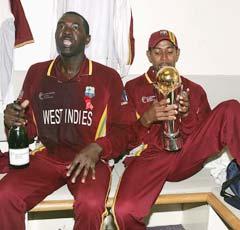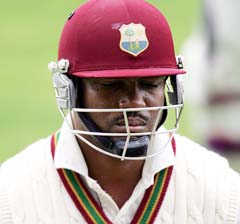At the tail-end of a dank autumn evening at the Oval two years ago those spectators with eyes sharp enough to pierce the gloom were rewarded with a reprise of times past.
 West Indies and England were locked in combat during a close-fought one-day final and again it was the cavaliers from the Caribbean who prevailed when Courtney Browne and Ian Bradshaw combined to win the ICC Champions Trophy.
West Indies and England were locked in combat during a close-fought one-day final and again it was the cavaliers from the Caribbean who prevailed when Courtney Browne and Ian Bradshaw combined to win the ICC Champions Trophy.
The two teams had contested the 1979 World Cup final at Lord's, which quickly turned into a no-contest after Viv Richards and Collis King savaged the England part-time bowlers and Joel Garner bowled a succession of match-winning yorkers.
In those far-off days West Indies and their former colonial rulers were masters of the one-day game which was to explode in popularity in the forthcoming decade.
West Indies possessed a string of exuberant batsman who fulfilled a long tradition by hitting the ball hard and often. Their fast bowling quartet was equally deadly in the five-day or one-day arena and their fielding was athletic, spectacular and effective.
England played the percentage game based on their familiarity with the genre, embraced by their otherwise conservative administrators who had quickly recognised the commercial possibilities of compressing an intricate game into one day with a guaranteed result.
BETTER RECORD
As a snapshot of the current one-day scene the 2004 Champions Trophy was an illusion.
In less than a year's time West Indies host the eighth version of the World Cup for the first time. They are currently ranked eighth of the 11 one-day nations, ahead only of Zimbabwe, Bangladesh and Kenya, and since the Champions Trophy even Bangladesh have a better record. England are marginally more successful in seventh spot.
Whatever the problems England suffer in the one-day game, their Test team has flourished over the past few years, culminating in last year's epic Ashes win over Australia.
West Indies have no such consolation. Their Test team have also been battered at home and abroad and the islands of the Caribbean archipelago, which have given so much to the summer game of the British Commonwealth, are also eighth in the Test championship.
Writer and commentator Tony Cozier, who has chronicled the good and bad times with dispassionate acuity, does not pull his punches in the latest edition of the Wisden Cricketers' Almanac.
"Over the past decade, this space in the almanac has become an annual litany of despair," Cozier writes. "Last year's report on West Indies cricket referred to 'the most agonising period in its history'; the year that followed was to be even worse."
The problems have been well documented. They include lack of investment, inter-island bickering and declining facilities in a part of the world where money is scarce.
TRAVEL DEMANDS
Next year West Indies stage the most logistically complicated of all the World Cups with endless criss-crossing between the islands and the consequent demands on already over-stretched internal airlines.
 Sustained success by the home side, culminating in an appearance in the final in Barbados, the tiny island which has nurtured more great cricketers per square metre than any other area on earth, would make these ailments inconsequential.
Sustained success by the home side, culminating in an appearance in the final in Barbados, the tiny island which has nurtured more great cricketers per square metre than any other area on earth, would make these ailments inconsequential.
Sadly, there is little to indicate that the current West Indies side are even likely semi-finalists.
Brian Lara has been given a third tilt at the captaincy and his batting genius is unquestioned. But he is now 37, with his reflexes inevitably blunted, and his critics contend that his previous terms in charge contributed to rather than alleviated the current malaise.
Certainly, the West Indies have been sloppy and often unprofessional in the current one-day series against a Zimbabwe side of neophytes whose troubled country cannot even sustain a first-class team competition.
Can they now summon the fierce, impersonal pride which helped to conquer the cricketing world and provided the one unifying force throughout the scattered Caribbean islands? Or will the World Cup become another sorry footnote in the decline of a game which was as much a cultural as a sporting force?
Photographs: Getty Images








 © 2025
© 2025